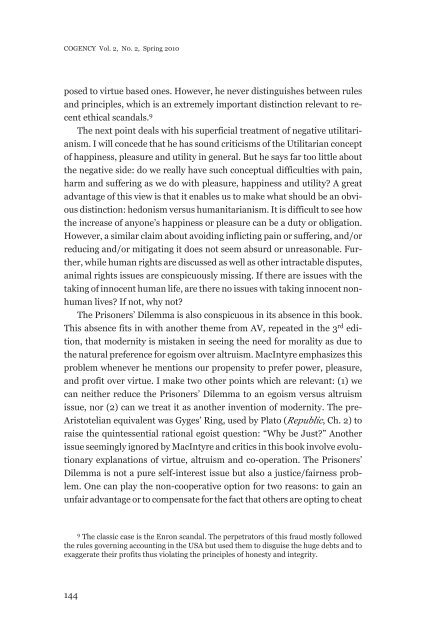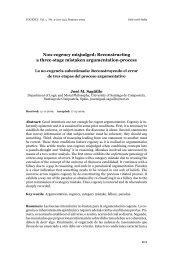Cogency v2 n2
Cogency v2 n2
Cogency v2 n2
You also want an ePaper? Increase the reach of your titles
YUMPU automatically turns print PDFs into web optimized ePapers that Google loves.
COGENCY Vol. 2, N0. 2, Spring 2010<br />
posed to virtue based ones. However, he never distinguishes between rules<br />
and principles, which is an extremely important distinction relevant to recent<br />
ethical scandals. 9<br />
The next point deals with his superficial treatment of negative utilitarianism.<br />
I will concede that he has sound criticisms of the Utilitarian concept<br />
of happiness, pleasure and utility in general. But he says far too little about<br />
the negative side: do we really have such conceptual difficulties with pain,<br />
harm and suffering as we do with pleasure, happiness and utility? A great<br />
advantage of this view is that it enables us to make what should be an obvious<br />
distinction: hedonism versus humanitarianism. It is difficult to see how<br />
the increase of anyone’s happiness or pleasure can be a duty or obligation.<br />
However, a similar claim about avoiding inflicting pain or suffering, and/or<br />
reducing and/or mitigating it does not seem absurd or unreasonable. Further,<br />
while human rights are discussed as well as other intractable disputes,<br />
animal rights issues are conspicuously missing. If there are issues with the<br />
taking of innocent human life, are there no issues with taking innocent nonhuman<br />
lives? If not, why not?<br />
The Prisoners’ Dilemma is also conspicuous in its absence in this book.<br />
This absence fits in with another theme from AV, repeated in the 3 rd edition,<br />
that modernity is mistaken in seeing the need for morality as due to<br />
the natural preference for egoism over altruism. MacIntyre emphasizes this<br />
problem whenever he mentions our propensity to prefer power, pleasure,<br />
and profit over virtue. I make two other points which are relevant: (1) we<br />
can neither reduce the Prisoners’ Dilemma to an egoism versus altruism<br />
issue, nor (2) can we treat it as another invention of modernity. The pre-<br />
Aristotelian equivalent was Gyges’ Ring, used by Plato (Republic, Ch. 2) to<br />
raise the quintessential rational egoist question: “Why be Just?” Another<br />
issue seemingly ignored by MacIntyre and critics in this book involve evolutionary<br />
explanations of virtue, altruism and co-operation. The Prisoners’<br />
Dilemma is not a pure self-interest issue but also a justice/fairness problem.<br />
One can play the non-cooperative option for two reasons: to gain an<br />
unfair advantage or to compensate for the fact that others are opting to cheat<br />
9<br />
The classic case is the Enron scandal. The perpetrators of this fraud mostly followed<br />
the rules governing accounting in the USA but used them to disguise the huge debts and to<br />
exaggerate their profits thus violating the principles of honesty and integrity.<br />
144








